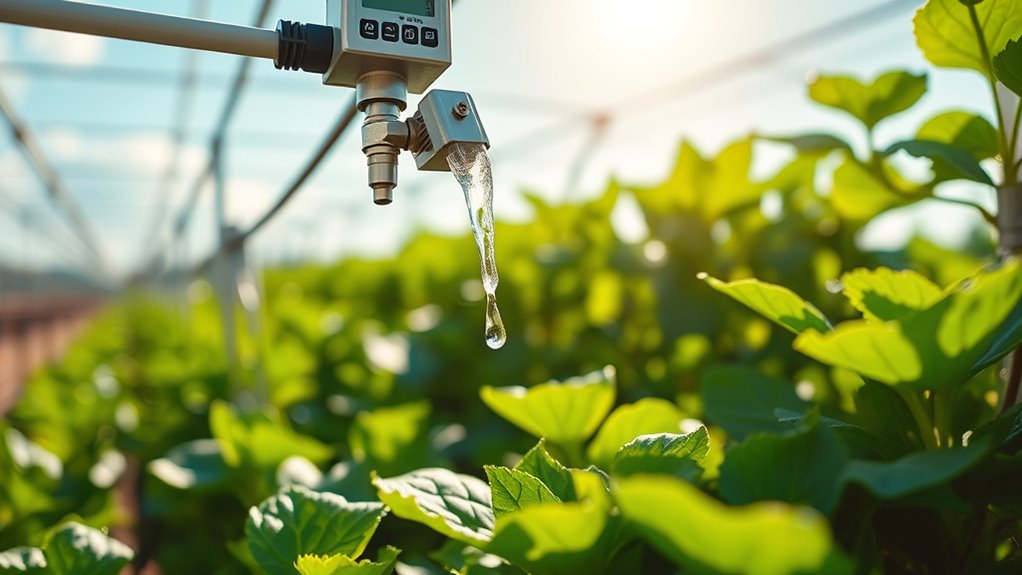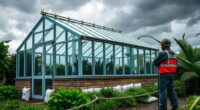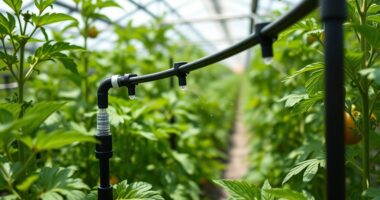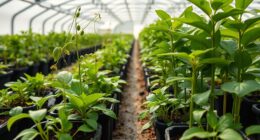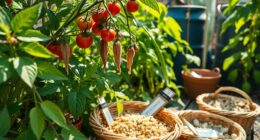Smart fertigation combines nutrients with irrigation, allowing you to deliver essential fertilizers directly through your watering system. This approach optimizes nutrient absorption, reduces water use, and minimizes environmental impacts like runoff. By integrating sensors and automation, you can precisely control when and how nutrients are applied, improving crop yields and soil health. Continuing with this approach, you’ll discover how smart fertigation supports sustainable farming and maximizes resources for better results.
Key Takeaways
- Smart fertigation integrates sensors and automation for precise nutrient and water delivery based on real-time soil data.
- It enhances crop efficiency by synchronizing fertilization with irrigation, reducing waste and over-application.
- Advanced technology enables tailored nutrient management, improving yields and soil health sustainably.
- Combines irrigation and fertilization to conserve water, minimize environmental impact, and optimize resource use.
- Supports sustainable agriculture through data-driven decisions, promoting efficient, eco-friendly farming practices.

Have you ever wondered how farmers efficiently deliver nutrients to their crops? The answer lies in the innovative practice of fertigation, which combines fertilization with irrigation. This method allows you to supply plants with essential nutrients directly through the water you already use for watering. By integrating fertilization into your irrigation system, you can optimize nutrient delivery, ensuring your crops get what they need precisely when they need it. This not only boosts crop growth but also helps maintain soil health by reducing the risk of over-fertilization and nutrient runoff. When nutrients are applied directly to the root zone via water, you minimize waste and prevent excess chemicals from leaching into the environment. This targeted approach promotes a balanced soil ecosystem, encouraging beneficial microorganisms and improving overall soil structure. As a result, your soil remains resilient and productive over time.
Water conservation is another significant benefit of smart fertigation. Traditional methods often involve applying large quantities of fertilizers and water separately, which can lead to wastage. With fertigation, you use your water more efficiently because you’re delivering nutrients in sync with irrigation schedules. This means you can reduce the total volume of water needed while still providing adequate nourishment to your crops. It’s especially advantageous in areas facing water scarcity, where every drop counts. By carefully controlling the amount and timing of water and nutrient application, you also prevent waterlogging and runoff, which can carry pollutants into nearby water bodies. This careful management supports sustainable farming practices, conserving water resources and protecting the environment.
Moreover, fertigation systems often incorporate advanced technology, such as sensors and automated controllers, that give you real-time data on soil moisture and nutrient levels. This data allows you to fine-tune your irrigation and fertilization plans with precision, ensuring your crops get the right amount of nutrients at the right time. Not only does this improve crop yields, but it also reduces costs associated with over-application and waste disposal. Over time, you’ll notice healthier plants and more efficient use of resources. This approach aligns with modern principles of sustainable agriculture, emphasizing the importance of preserving soil health and water resources for future productivity.
In addition, water quality plays a crucial role in fertigation effectiveness and crop health.
In essence, smart fertigation empowers you to manage your farm more intelligently. It simplifies nutrient management, promotes soil health, and conserves water—all while maximizing crop output. By adopting these techniques, you’re not just improving your farm’s efficiency; you’re also taking steps toward a more sustainable and environmentally friendly way of farming.
Frequently Asked Questions
How Does Smart Fertigation Impact Crop Yields Long-Term?
Smart fertigation boosts your crop yields long-term by improving crop health and maintaining soil fertility. It delivers nutrients precisely when plants need them, reducing waste and preventing deficiencies. As a result, your crops grow stronger and more resilient over time. This targeted approach promotes sustainable farming, ensuring your soil stays fertile and productive, leading to consistent, higher yields season after season.
What Are the Cost Considerations for Implementing Smart Fertigation Systems?
When implementing smart fertigation systems, you should consider equipment costs, which can be significant upfront, and ongoing maintenance expenses that guarantee ideal performance. While these costs might seem high initially, they often lead to savings through efficient water and nutrient use. You’ll want to evaluate your farm’s scale and long-term benefits to determine if the investment aligns with your budget and productivity goals.
How Is Nutrient Leaching Minimized With Smart Fertigation?
You minimize nutrient leaching by precisely controlling nutrient application through smart fertigation systems, reducing nutrient runoff into surrounding soil and water. This approach keeps nutrients in the root zone, improving soil health and guaranteeing environmental impact. You also monitor soil moisture levels continuously, adjusting irrigation and fertilizer delivery accordingly. This targeted method ensures plants get what they need without excess, promoting sustainable farming and protecting natural resources.
Can Small-Scale Farms Effectively Adopt Smart Fertigation Technologies?
Yes, small-scale farms can effectively adopt smart fertigation technologies. You can use drip irrigation combined with soil sensors to precisely deliver nutrients, reducing waste and improving crop yields. These tools help you monitor soil conditions in real-time, ensuring ideal nutrient application. While initial setup might be a bit of an investment, the long-term savings on water and fertilizers make it worthwhile, making smart fertigation accessible and beneficial for small farms.
What Training Is Needed for Farmers to Operate Smart Fertigation Systems?
You’ll need targeted farmer education to operate smart fertigation systems confidently. Gain technical skills through hands-on training on system setup, nutrient management, and troubleshooting. Workshops and online courses offer valuable knowledge, helping you understand sensor calibration, data interpretation, and system integration. Developing these skills guarantees you can optimize water and nutrient use, improving yields. The more you learn, the more effectively you can manage your fertigation system, making your farm more sustainable and profitable.
Conclusion
By embracing smart fertigation, you’re truly combining the best of both worlds—efficient irrigation and precise nutrient delivery. This approach helps you get the most out of your crops while conserving resources. Remember, “a stitch in time saves nine”—addressing your needs early on prevents bigger problems down the road. So, stay proactive, adapt smartly, and watch your yields flourish with less waste and more success.
